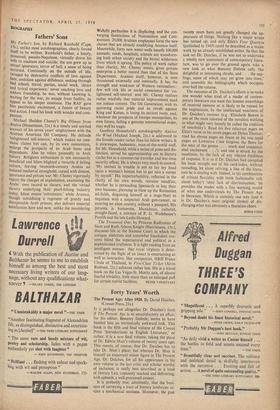Forty' Years' Worth
The Present Age: After 1920. By David Daiches. (Cresset Press, 21s.) IT is perhaps not altogether Dr. Daiches's fault if The Present Age is so unsatisfactory an affair,' for his editor, Bonamy Dobrde, seems to have handed him an intrinsically awkward, task. This book is the fifth and final volume of the Cresset Press 'Introductions to English Literature,' or rather, it is a new final volume, taking the place of Dr. Edwin Muir's volume of twenty years ago, This means, of course, that Dr. Daiches has to take Dr. Muir's place; but whereas Dr. Muir is himself an important minor figure in The Present Age, Dr. Daiches, for all his appearance in his own volume as the last critic and scholar worthy of inclusion, is really best described as a kind of literary Leo, copiously stocked and delivering, with aplomb, a well-processed answer.
It is probably true, admittedly, that the busi- ness of surveying a tract of literary landscape in- vites a mechanical neatness. Moreover, the past twenty years have not greatly changed the ap- pearance of things. Nothing like a major writer has turned up, and only Eliot's Four Quartets (published in 1943) could be described as a major work by an already established writer. So that the task set Dr. Daiches, if he was not to undertake a wholly new assessment of contemporary litera- ture, was to go over the ground again, take a new look at what Bonamy Dobrde calls 'the delightful or interesting shrubs, and . . . the sap- lings, some of which may yet grow into trees, and assemble the bibliography which occupies over half the volume.
The outcome of Dr. Daiches's efforts is to make one wonder what kind of a reader of contem- porary literature can want this leonine assemblage of received opinion or is likely to be roused by the imprecision, by the intellectual weariness of Dr. Daiches's manner (e.g. 'Elizabeth Bowen is one of the most talented of the novelists working. in what might very loosely be called the tradition of sensibility'). Read his five reluctant pages on Eliot's verse or his seven pages on Dylan Thomas; read his eleven pages on Joyce or his two tepid pages on Lawrence ('one forgives the flaws for the sake of the genius . . . murk and unassimil- ated excitement . . .'); and one is struck by the mustiness, by the lack of any vibrant freshness of response. It is as if Dr. Daiches had compiled his book straight out of his card-index, without rereading, let alone reliving, a line of the litera- ture he is dealing with. Indeed, in his combination of critical flaccidity with brisk fashionable talk. about today's 'utter lack of discrimination,' he provides the reader with a fine working model of what one understands by The Present Age in literature. Which is certainly one way (and it is Dr. Daiches's most original • stroke) of dis- charging what was obviously a thankless chore.














































 Previous page
Previous page